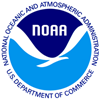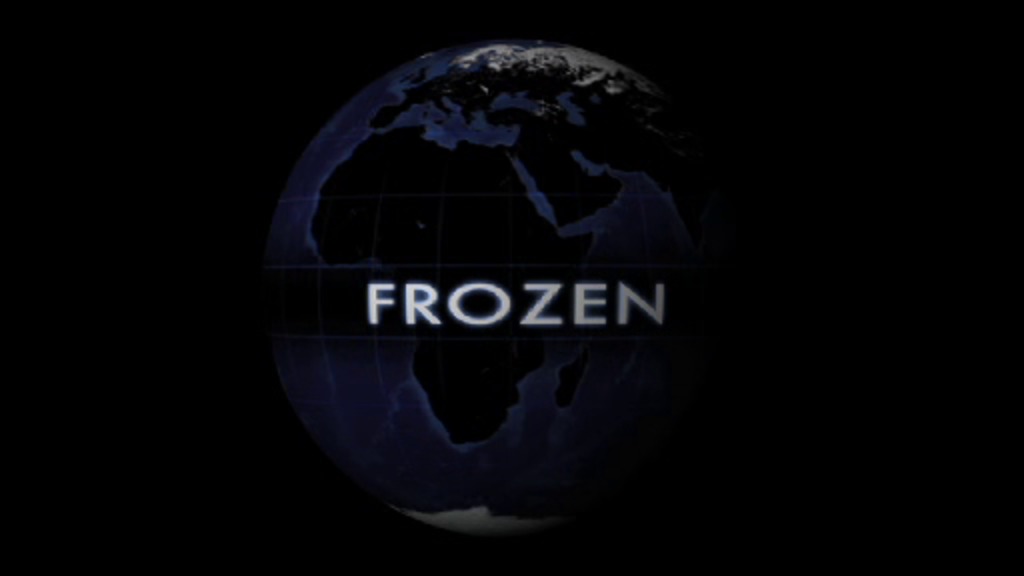FROZEN: The Full Story
On March 27, 2009, NASA released FROZEN, a twelve-minute show about the Earth's frozen regions designed for Science On a Sphere. Science On a Sphere was created by NOAA and displays movies on a spherical screen, which is ideal for a show about the Earth or the planets. The audience can view the show from any side of the sphere and can see any part of the Earth. Making a movie for this system is challenging, and FROZEN was an exciting project to create. Until now, only the "trailer" for FROZEN has been available for viewing from our site. Here, for the first time, is an on-line version of the complete show, presented in several different formats that show different aspects of the movie.
This version of FROZEN simulates the experience of two separate viewers on opposite sides of the sphere. Sometimes the two viewers see the same thing, but most of the time they see different parts of the Earth.
Complete transcript available.
This video is also available on our YouTube channel.
This is the full frame version of FROZEN. This full frame movie is automatically split into parts by the Science On a Sphere system and projected onto the entire sphere.
NOAA's official site for downloading this movie for Science On a Sphere is here. The version at the NOAA site is 2000x1000 and is masked along the lower edge so as to display better on the spherical projection system.
This is the Magic Planet version of FROZEN. This version is meant to be projected from the bottom of the sphere onto the sphere's inside surface. The result is a view of the program where the top of the sphere is in the center and the bottom of the sphere is stretched around the outside edge of the circular image.
A Magic Planet-ready version of this movie in divx format is here.
Credits
Written, Produced and Directed by
Michael Starobin and Horace Mitchell
Based on a presentation by
Dr. Robert Bindschadler/GSFC
Edited by
Victoria Weeks
Narrated by
Craig Sechler
Music by
Andre Gribou
Script Development Team
Michael Starobin
Horace Mitchell
Victoria Weeks
Greg Shirah
Cindy Starr
The Scientific Visualization Studio/NASA GSFC
Director of Data Visualization
Horace Mitchell
Visualization Team
Cindy Starr
Lori Perkins
Tom Bridgman
Greg Shirah
Software Development
Greg Shirah
Eric Sokolowsky
Animation
Ivy Flores
Andrej Bevec
Walt Feimer
Set Construction and Practical Effects
Chris Meaney
Stop Action Photography
Pat Izzo
Infrared Videography
Ed Weibe
Videography
Chris Smith
Victoria Weeks
Studio Crew
Shane Keating
Richard Melnick
Jennifer Lentz
Tatyana Pokrovskaya
Sound Design
Michael Starobin
Audio Engineering and Assistant to the Composer
Eric Arvai
Recording Engineer
Mike Velle
Account Management
Mike Velle
IT Management
Pankaj Jaiswal
Stuart Snodgrass
Jim Williams
Science On a Sphere Project Liaison
Maurice Henderson
Photographic Research
Eric Erbe
Production Photography
Debora McCallum
Pat Izzo
Voice Casting
Sandy Stern Casting, LLC
Cast
Mara Bayewitz
Chris Meaney
Andy Freeberg
Helen-Nicole Kostis
Scientific Consultants
Dr. Bob Bindschadler, GSFC
Dr. Waleed Abdalati, CIRES/CSES
Dr. Thorsten Markus, GSFC
Dr. Richard S. Williams, Jr., USGS
Antarctica Video
PolarPalooza/Passport to Knowledge
Ilulissat Glacier Sequence
Jason Amundson, University of Alaska Fairbanks
Glacier Images provided by
Mike Embree, The National Science Foundation
W. T. Pfeffer, Institute of Arctic and Alpine Research, University of Colorado
Dr. Roland Warner, Antarctic Climate and Ecosystems Cooperative Research Centre and Australian Antarctic Division
Permafrost Images provided by
F.T. Eyre, U.S. Army Corps of Engineers
Marilyn Aber, U.S. Army Corps of Engineers
Michael J. Coffey, Alaska Department of Transportation and Public Facilities
Data Sources
Blue Marble Next Generation Seasonal Landcover Reto Stockli (NASA/GSFC)
City lights -- Image and Data processing by NOAA's National Geophysical Data Center from DMSP data collected by the US Air Force Weather Agency.
Circum-Arctic map of permafrost and ground-ice conditions: National Snow and Ice Data Center/World Data Center for Glaciology
Landsat Image Mosaic of Antarctica: The U.S. Geological Survey (USGS), the British Antarctic Survey (BAS), and the National Aeronautics and Space Administration (NASA), with funding from The National Science Foundation (NSF)
GLIMS glacier database Armstrong, R., B. Raup, S.J.S. Khalsa, R. Barry, J. Kargel, C. Helm, and H. Kieffer, National Snow and Ice Data Center
World glacier inventory: World Glacier Monitoring Service and National Snow and Ice Data Center/World Data Center for Glaciology
West Greenland Glacier Inventory 1992: Andreas Peter Ahlstrøm, Department of Quaternary Geology, Geological Survey of Denmark and Greenland, Copenhagen, Denmark
Groundwater Resources of the World: BGR Hannover / UNESCO Paris
2008 North American Atlas: Government of Canada, Natural Resources Canada, Canada Centre for Remote Sensing
The Antarctic Digital Database: copyright © 1993-2006 Scientific Committee on Antarctic Research <br/
Additional Thanks
Anker Weidick, Geological Survey of Denmark
Richard S. Williams, Jr., United States Geological Survey
Charles Swithinbank, British Antarctic Survey
The National Snow and Ice Data Center USGS Washington Water Science Center
Seth White -- www.sethwhite.org
Special thanks to Dr. Ming-Ying Wei, NASA Science Mission Directorate
Executive Producer for Honeywell Technology Solutions
Patrick Kennedy
Executive Producer for NASA Television
GSFC Wade Sisler
Science On a Sphere was Developed by NOAA


FROZEN
Cold matters.
Copyright © 2009 NASA Goddard Space Flight Center All Rights Reserved
-
Animators
- Greg Shirah (NASA/GSFC)
- Lori Perkins (NASA/GSFC)
- Tom Bridgman (Global Science and Technology, Inc.)
- Walt Feimer (HTSI)
- Ivy Flores (IRC/UMBC)
- Andrej Bevec (UMBC)
-
Visualizer
- Cindy Starr (Global Science and Technology, Inc.)
-
Video editor
- Victoria Weeks (HTSI)
-
Producer
- Michael Starobin (HTSI)
-
Scientists
- Bob Bindschadler (NASA/GSFC)
- Waleed Abdalati (NASA/GSFC)
- Thorsten Markus (NASA/GSFC)
-
Project support
- Shane Keating (Global Science and Technology, Inc.)
- Jennifer Lentz (HTSI)
- Rich Melnick (HTSI)
- Tatyana N. Pokrovskaya (HTSI)
-
Videographers
- Victoria Weeks (HTSI)
- Ed Weibe (HTSI)
- Pat Izzo (TRAX International)
- Chris Smith (HTSI)
-
Writers
- Michael Starobin (HTSI)
- Horace Mitchell (NASA/GSFC)
-
Data visualizer
- Horace Mitchell (NASA/GSFC)
Release date
This page was originally published on Thursday, June 25, 2015.
This page was last updated on Wednesday, May 3, 2023 at 1:49 PM EDT.
Series
This page can be found in the following series:Datasets used
-
Circum-Arctic Map of Permafrost and Ground-Ice Conditions
ID: 276This dataset can be found at: http://nsidc.org/data/docs/fgdc/ggd318_map_circumarctic/index.html
See all pages that use this dataset -
World Glacier Inventory
ID: 278 -
Earth at Night [DMSP: OLS]
ID: 286 -
Blue Marble Land Cover [Terra and Aqua: MODIS]
ID: 510Credit: The Blue Marble data is courtesy of Reto Stockli (NASA/GSFC).
See all pages that use this dataset -
LIMA (Landsat Image Mosaic of Antarctica) [Landsat-7: ETM+]
ID: 599Mosaicing to avoid clouds produced a high quality, nearly cloud-free benchmark data set of Antarctica for the International Polar Year from images collected primarily during 1999-2003.
This dataset can be found at: http://lima.nasa.gov/
See all pages that use this dataset -
West Greenland Glacier Inventory (Glacier Inventory of West Greenland)
ID: 603This dataset can be found at: http://nsidc.org/data/g01375.html
See all pages that use this dataset -
The Antarctic Digital Database (ADD) (Antarctic Digital Database, The)
ID: 606This dataset can be found at: http://www.add.scar.org:8080/add
See all pages that use this dataset -
GLIMS Glacier Database
ID: 609Global Land Ice Measurements from Space (GLIMS) is an international project with the goal of surveying a majority of the world's estimated 160,000 glaciers. GLIMS uses data collected primarily by the Advanced Spaceborne Thermal Emission and Reflection Radiometer (ASTER) instrument aboard the Terra satellite and the LANDSAT Enhanced Thematic Mapper Plus (ETM+), along with historical observations.
This dataset can be found at: http://nsidc.org/data/nsidc-0272.html
See all pages that use this dataset -
North American Atlas
ID: 610 -
Groundwater Resources of the World
ID: 611
Note: While we identify the data sets used on this page, we do not store any further details, nor the data sets themselves on our site.
